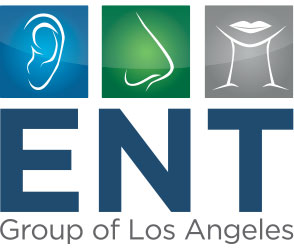Allergies & Sinusitis
The physicians and staff of the ENT Group of Los Angeles have put together the following resources in order to better assist you.
Taste & Smell Disorders
Taste and smell disorders are closely related, common conditions that affect the chemosensation system and may develop as a result of genetic factors, injury, upper respiratory infections or exposure to certain chemicals. Taste and smell disorders are common conditions that affect many people each year.
Gustatory cells react to the food and beverages that we consume and trigger a signal to the brain that allows us to taste different flavors. The sense of taste is actually transmitted primarily through the sense of smell, although taste nerves also serve an important function. In many cases, patients may visit a doctor complaining of a problem with their sense of taste and learn instead that they have a smell disorder.
Causes Of Taste And Smell Disorders
SMELL DISORDERS
Smell disorders may be caused by many different factors, some of which include:
- Head trauma
- Upper respiratory infections
- Nasal polyps
- Diseases such as Alzheimer’s, Parkinson’s and multiple sclerosis
- Certain medications
- Hormonal disturbances
- Cocaine abuse
- Dental problems
- Toxic chemical exposure
- Aging
TASTE DISORDERS
Taste disorders may develop from a number of different factors including:
- Genetics
- Surgery of the ear, nose or throat
- Head injury
- Upper respiratory infections
- Exposure to certain chemicals
- Certain medications
- Dental problems
Taste disorders may also be a side effect of radiation therapy for head and neck cancer.
Types Of Taste And Smell Disorders
TASTE DISORDERS
Hypogeusia – A decreased ability to taste strong flavors.
Ageusia – A complete loss of taste.
Dysgeusia – An abnormal change in taste.
SMELL DISORDERS
Anosmia – A complete loss of smell and the most common smell disorder, which can be temporary or permanent.
Dysosmia – A distorted sense of smell in which the person smells unpleasant odors that do not exist.
Hyperosmia – An increased sensitivity to smell.
Hyposmia – A decreased sense of smell that is usually temporary.
Presbyosmia – A gradual decrease in the sense of smell that occurs with aging.
Treatment For Taste And Smell Disorders
While taste and smell disorders are not serious, they can often affect daily life and may lead to unpleasant side effects. Treatment for these conditions usually focuses on treating the underlying cause of the condition, while direct treatments may range from simple life changes to surgery. Some cases may improve on their own.
SMELL DISORDER TREATMENT
Treatment for smell disorders depends on the cause of the condition. When the condition is caused by a viral infection or an allergic reaction, it will usually clear up on its own, though an over-the-counter decongestant may open the nasal passages and provide some relief. If a smell disorder results from an infection, an antibiotic may be prescribed. When the condition is the result of a nasal polyp or other obstruction, surgery may be required. When the smell disorder results from a particular medication, it may be possible to discontinue taking the medication or a substitution may sometimes be made. If the smell disorder is a result from a disease, there may be no effective remedy. Age-related smell disorders often cannot be treated.
TASTE DISORDER TREATMENT
Treatment for taste disorders also depends on the cause of the condition, but may include treating the underlying cause. Some people with taste disorders caused by respiratory infections or allergies, regain their sense of taste when these conditions are resolved. When the taste disorder results from a particular medication, it may be possible to discontinue taking the medication and change to another medication, although this change should always be done under a doctor’s supervision. Some taste disorders may also get better on their own.
Patients experiencing symptoms of a smell or taste disorder should consult with their doctor to receive proper treatment or advice for coping with the condition.
For more information on any of our services please call (844) 4-ENTDOC (844) 436-8362.
